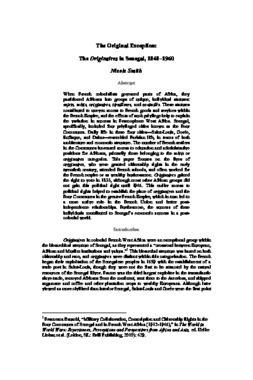| dc.creator | Smith, Nicole | |
| dc.date.accessioned | 2018-02-14T22:22:18Z | |
| dc.date.accessioned | 2021-04-14T14:32:47Z | |
| dc.date.available | 2018-02-14T22:22:18Z | |
| dc.date.available | 2021-04-14T14:32:47Z | |
| dc.date.issued | 2017 | |
| dc.identifier.uri | https://hdl.handle.net/11244.46/1397 | |
| dc.description | © 2017, The Journal of Global Affairs is the official student research publication of the Department of International and Area Studies in the College of International Studies at the University of Oklahoma. Correspondence may be sent to: Journal of Global Affairs, C/O CIS/DIAS, 729 Elm Avenue, Hester Hall 150, Norman, Oklahoma 73019, United States of America. Email: jga@ou.edu. | |
| dc.description.abstract | When French colonialists governed parts of Africa, they partitioned Africans into groups of unique, individual statuses: sujets, metis, originaires, tirailleurs, and assimiles. These statuses contributed to uneven access to French goods and services within the French Empire, and the effects of such privilege help to explain the variation in success in Francophone West Africa. Senegal, specifically, included four privileged cities known as the Four Communes. Daily life in these four cities - Saint-Louis, Goree, Rufisque, and Dakar - resembled Parisian life, in terms of both architecture and economic structure. The number of French settlers in the Communes increased access to education and administrative positions for Africans, primarily those belonging to the metis or originaires categories. This paper focuses on the lives of originaires, who were granted citizenship rights in the early twentieth century, attended French schools, and often worked for the French empire or as wealthy businessmen. Originaires gained the right to vote in 1833, although most other African groups did not gain this political right until 1946. This earlier access to political rights helped to establish the place of originaires and the Four Communes in the greater French Empire, which in turn led to a more active role in the French Union and better post-independence relationships. Furthermore, the success of these individuals contributed to Senegal's economic success in a post-colonial world. | |
| dc.description.abstract | About Nicole Smith | |
| dc.description.abstract | Nicole Smith is pursuing her Master of Arts in International Studies with a focus on economic development in Africa. Her thesis, ^The Dynamics of Identity in Determining French Foreign Aid,^ investigates how French bilateral aid is determined by colonial relationships and the policy of Fran^afrique. She received her Bachelor of Arts in Economics and Religious studies with honors and a minor in French in May 2015 from the University of Oklahoma. She works as a research assistant for World Neighbors, a nonprofit organization in O|klahoma City focused on sustainable development. After graduation in May 2017, Smith will continue to be a life-long student and pursue a Master of Arts in Quantitative Methods for Social Sciences at Columbia University. | |
| dc.description.sponsorship | The Journal of Global Affairs is published in conjunction with the College of International Studies at the University of Oklahoma. | |
| dc.format.extent | 21 pages | |
| dc.format.extent | 456,991 bytes | |
| dc.format.medium | application.pdf | |
| dc.language | en | |
| dc.relation.ispartofseries | Journal of Global Affairs ; 6 (January 2017) | |
| dc.relation.requires | Adobe Acrobat Reader | |
| dc.rights | Attribution 4.0 International (CC BY 4.0) | |
| dc.rights.uri | https://creativecommons.org/licenses/by/4.0/ | |
| dc.title | The Original Exception: The Originaires in Senegal, 1848-1960 | |
| dc.type | document | |
| dc.type | text | |
| dc.type | image | |
| dc.contributor.sponsor | University of Oklahoma. College of International Studies | |
| dc.description.undergraduate | undergraduate | |

